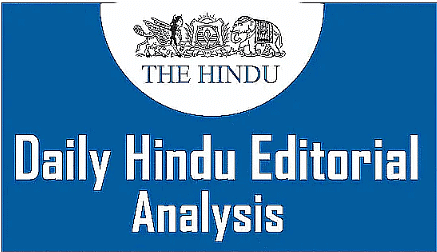UPSC Exam > UPSC Notes > Current Affairs & Hindu Analysis: Daily, Weekly & Monthly > The Hindu Editorial Analysis- 5th July 2024
The Hindu Editorial Analysis- 5th July 2024 | Current Affairs & Hindu Analysis: Daily, Weekly & Monthly - UPSC PDF Download

Computer Literacy in India Needs a Reboot
Why in News?
In today’s world, computer literacy is vital as critical services like banking, healthcare, and government services have gone digital. Being computer literate means having the knowledge and ability to use computers and technology efficiently, which allows individuals to access and utilize these services effectively, thereby improving their quality of life. The COVID-19 pandemic underscored the importance of computer and internet access for activities such as ordering groceries, online education, and managing banking and healthcare services.
Initiatives in Computer Literacy
- Digital India Campaign (2015): Launched by the Indian government to create a digitally empowered society.
- Integration into Education: Computer education is becoming part of the formal education system from an early age in schools.
- Skill Development Programs: Various programs aim to enhance computer literacy among youth and adults, focusing on underprivileged and marginalized communities to reduce the digital divide.
Recent Findings from NSS 78th Round (2020-21)
- Increase in Computer Literacy:
- Overall: Computer literacy rose from 18.4% in 2017-18 to 24.7% in 2020-21 among individuals aged 15 and above.
- Rural Areas: Increased from 11.1% to 18.1%.
- Urban Areas: Increased from 34.7% to 39.6%.
Challenges and Concerns
- Digital Divide: Despite improvements, the figures are concerning for the nation’s digital ambitions.
- Rural Disadvantages: Nearly 70% of India’s rural population may face substantial disadvantages without significant efforts to universalize digital literacy.
- Exclusion Risk: A significant portion of the population risks being excluded from accessing various public services through digital technology due to low digital literacy.
Unequal Literacy Across Age Groups
- Age Disparity: Computer literacy varies significantly across different age groups in India.
- Younger Demographics: Display higher rates of computer literacy.
- Older Demographics: Display lower rates of computer literacy.
- Cohort Effect: Reflects the disparity in access to computer education between younger and older generations.
Computer Literacy Rates by Age Group
- Overall Rate: 24.7% among individuals aged 15 and above.
- Peak: 45.9% among individuals aged 20-24 years.
- Lowest: 4.4% among individuals aged 65-69 years.
- Career Age Group (20-39 years): 34.8%.
State-wise Variation in Computer Literacy (Age 20-39 Years)
- Kerala: 72.7%.
- Assam: 17.6%.
- Economically Disadvantaged States: Less than 30% proficiency.
- Assam: 17.6%
- Bihar: 20.4%
- Madhya Pradesh: 21%
- Jharkhand: 21.2%
- Uttar Pradesh: 22.9%
- Odisha: 25.1%
- Chhattisgarh: 26%
- Rajasthan: 27.6%
Impact and Challenges
- Digital Divide: Lower rates in economically backward states exacerbate their disadvantage.
- Infrastructure Deficiency: Many schools and colleges lack necessary infrastructure and qualified teachers.
- Older Age Groups: Computer illiteracy due to lack of motivation or access to learning resources.
Computer Literacy as a Necessity
- Employment Opportunities: Computer illiteracy restricts job prospects.
- Social and Financial Exclusion: Limits access to online transactions and information.
- Employer Demand: Increasing need for employees with computer skills due to AI advancements.
Research Findings
- OECD PIAAC Survey (2014-15): Employment rate is 52.5% for adults without computer experience, compared to 72.7% for those with basic computer skills.
- Gang Peng (2017): Computer skills enhance employability and worker productivity.
- Preston-Lee Govindasamy: Positive correlation between computer literacy, employment probability, and earnings.
Focus Areas for Improvement
- Schools: Equip students with necessary computer skills.
- Older Population: Targeted programs for computer literacy.
- Government and NGO Involvement: Collaboration with local governing bodies to empower older individuals.
Conclusion
Government should review existing programs and develop strategies to achieve higher literacy rates and reduce disparities.
The document The Hindu Editorial Analysis- 5th July 2024 | Current Affairs & Hindu Analysis: Daily, Weekly & Monthly - UPSC is a part of the UPSC Course Current Affairs & Hindu Analysis: Daily, Weekly & Monthly.
All you need of UPSC at this link: UPSC
|
38 videos|5288 docs|1117 tests
|
FAQs on The Hindu Editorial Analysis- 5th July 2024 - Current Affairs & Hindu Analysis: Daily, Weekly & Monthly - UPSC
| 1. What are the current challenges faced by computer literacy in India? |  |
Ans. The current challenges faced by computer literacy in India include inadequate infrastructure, lack of access to computers and the internet in rural areas, limited availability of quality training programs, and outdated curriculum in educational institutions.
| 2. How can computer literacy be improved in India? |  |
Ans. Computer literacy in India can be improved by increasing access to computers and the internet, updating the curriculum to include relevant skills, providing quality training programs, and promoting digital literacy initiatives.
| 3. What role do government initiatives play in enhancing computer literacy in India? |  |
Ans. Government initiatives play a crucial role in enhancing computer literacy in India by implementing policies to promote digital literacy, providing funding for infrastructure development, and supporting initiatives to train individuals in digital skills.
| 4. What are the benefits of improving computer literacy in India? |  |
Ans. Improving computer literacy in India can lead to increased employment opportunities, enhanced digital skills for individuals, better access to information and resources, and overall economic growth through the digital sector.
| 5. How can individuals contribute to promoting computer literacy in India? |  |
Ans. Individuals can contribute to promoting computer literacy in India by participating in digital skills training programs, sharing knowledge with others, supporting initiatives that provide access to technology, and advocating for the importance of digital literacy in education and society.
Related Searches





















